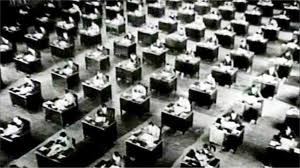We all carry around more technology in our pockets than NASA had at the time of the first rocket launch. Ever since technology has been incorporated into the world around us, the way we act and interact has changed remarkably. We are no longer culpable individuals; so much of what we do goes through a technological go between and therefore, so much of what happens in the world happens as a result of technological innovation. We are all led to believe that technology has indelibly bettered the way by which we live in the modern world. Without it, the world would be powerless and would be plunged into an inevitable technological ice age, in which we are all isolated individuals and the world will grind to a halt.
Or so we think. There are small voices which go against the volume of the crowd, voices which increasingly grow momentum and stature of their own. Adam Curtis is one of those voices. The British filmmaker is responsible for some of the most thought provoking documentary pieces, his interest focused in power within society. His most famous film, The Century of the Self, looks at how Freud’s theories of the subconscious shaped modern advertising and marketing. Since the 1980s, Curtis has looked at war correspondence, international revolutions, modern freedom and the rise of technology. His work reads like a zeitgeist of modern paranoia, honing in on the aspects of everyday life which we fear and which could destruct the world.
It’s his BBC documentary All Watched Over by Machines of Loving Grace that I’m really interested in. Split into three parts, the series looks at three ways in which computers have been used as markers of stability and liberation but how our reliance on them has ultimately led to distortion and oversimplification of the world around us, to use Curtis’ words. Each episode is an in depth and, often, labyrinthine study of how computers have let us down. In a three week series, I am going to look at each episode and try and pick apart Curtis’ argument, asking if his claims still hold true three years down the line.
In the first episode ‘Love and Power’, Curtis looks at how our belief in computers screwed us over, jumping from Ayn Rand to Silicon Valley to Bill Clinton to Asia. You may need to make notes. Ready? Ok. Ayn Rand wrote a novel called Atlas Shrugged, promoting the idea that we should all focus on selfish desire and become our own hero. This idea became popular in the Silicon Valley in the ‘90s; computer programmers created technology which would help them achieve self-stabilising order, allowing them to focus on their own selfish desires and become Randian heroes. With the new computer systems driving the market, shares rose and interest rates fell, creating a huge accumulated wealth in the US. Soon, however, things began to go south. The markets became overvalued and what was believed to be economic growth was in fact overexuberance, meaning that the increase in productivity was just an illusion. The economic bubble burst in the US and Asia and chaos rained down.
This is where things get confusing. Curtis makes a detour to Asia, showing how American bankers bailed out Indonesia and the East as they went into economic free fall. Soon, however, the money disappeared and things were even worse for the East. The promise of a new, computerised economy had been initiated to remove political corruption from the markets but in fact, its collapse has launched the American market into a complicated web of politics. Withdrawing their money from Asia, American bankers used the international financial collapse to save their own skins, destructing the notion of the Randian hero.
Curtis argues that our belief in computer systems led to our downfall. After we tasked the computer with stabilising our economic systems, we believed that we were free to act as we wished; the computers would sort it out. Our fundamental problem lay in the fact that we believed computers were superhuman, better than their inventors. We forgot that we were the brains behind the supposedly infallible new technology and therefore, there was little chance that it could somehow create a better future for us out of nothing.
We consistently look to technology as a force which is gaining its own momentum and in a sense, this is true. The developments in technology over the past ten years have been undeniably fast, seeming to be a self-fulfilling prophecy, hurtling forward into the future whilst we humans barely hang on. In fact, the changes that we see around us have come about due to demand. As we acclimatise to changes in computers, we expect more and more with increasing pace. We are the reason that technology is running out of our reach, developing into places that we soon won’t be able to control.
As Curtis shows us, we consider technology as almost omnipotent, assuming that it will take control of situations whilst we continue doing what we want. In Love and Power at least, technology takes on a sort of moral compass whilst we indulge in our selfish fantasies.
Of course, everything starts to go wrong for the Randian heroes. Following the financial collapse and brief support from bankers, Indonesia and the East are left out on a limb, abandoned to sort themselves out. Unsurprisingly, Asia becomes wary of Western money, building back their economy singlehandedly and vowing never to accept help from the West in the same capacity. Pretty soon, the tables are turned. When the American economy collapses some years later, it is Asia and particularly China who bails them out. Selling goods to America with artificially low interest rates, Asia enabled them to take out much larger and riskier loans. Ironically, this led to the 2008 financial collapse. In Love and Power, Curtis shows how we raised technology up to a pedestal and were let down. Computers were ultimately a selfish invention, perpetuating an economic lie whilst giving the fat cats freedom to do what they wished.

